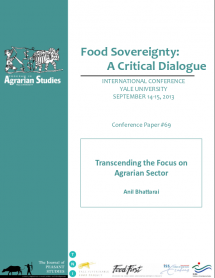In this paper, I argue that, together with building thriving and functionally integrated farm agroecologies and peasant-controlled economic practices, we need to pay serious attention to things that are normally considered beyond 'agriculture sector.' Very often, the crisis of agriculture is presented in terms of the spread of technologies that take farming away from the control of peasants and entangle them in relations of dependency to input traders, their transnational manufacturers and the transnational regime of intellectual property rights. In the process, farmers are dependent on alien markets for selling their surplus.
There is another, a more hopeful, side of the story, too. Throughout the world, growing number of farmers has been able to extricate itself from these entanglements by adopting agro-ecological management of farms and by building alternative mechanism for sharing resources such as seeds and knowledge. The spread of farmer-to-farmer network for sharing and innovating alternative technologies have shown impressive results in not only enhancing farmers' autonomy but also increasing productivity and resilience of farms.
This paper is based on my year-long ethnographic research in a predominantly small-holder Phulbari village of Chitwan Valley in south-central Nepal. I explored the way a couple hundred farming families have transitioned from high-chemical farming to agro-ecology based organic farming practices. In this paper I seek to show that, while agro-ecological practices and diversification of economic relations goes a long way in enhancing the autonomy of smallholder farmers, the increased privatization of education and health, lack of interest among young people in farming, increasing cost of building homes, and boom-and-bust cycle of land speculation pose significant challenges to maintaining the thriving agro-ecological practices in the coming years and decades.
I will finally conclude by making a case for broadening the vision of 'food sovereignty' to include issues related to public goods such as quality and access of education and health care, intergenerational transfer of agricultural skills, and ecological home building.
Anil Bhattarai, PhD candidate, Programme in Planning and Department of Geography, University of Toronto Anil Bhattarai is currently writing his Ph.D. dissertation on sustainable agriculture in Nepal’s Chitwan valley. Currently based in the Programme in Planning and Department of Geography at University of Toronto, Canada, his scholarly interests include ecological future, creative production, democratization, social justice, sustainable agriculture, public health, ecological designs, and politically-engaged scholarship. Besides academic pursuits, he has been writing regular column, (un)commonsense for The Kathmandu Post, an English-language daily broadsheet newspaper (with online presence), since May 2009. During his ethnographic field work in Nepal in 2010-2011, he built a small earthbag home and innovated on washable mud-floors and bamboo crafts, and planted an agroforest in an acre of land. He was actively involved in Citizens Movement for Democracy and Peace during Nepal’s second popular democratic movement in 2005.
Food Sovereignty: a critical dialogue, 14 - 15 September, New Haven.

